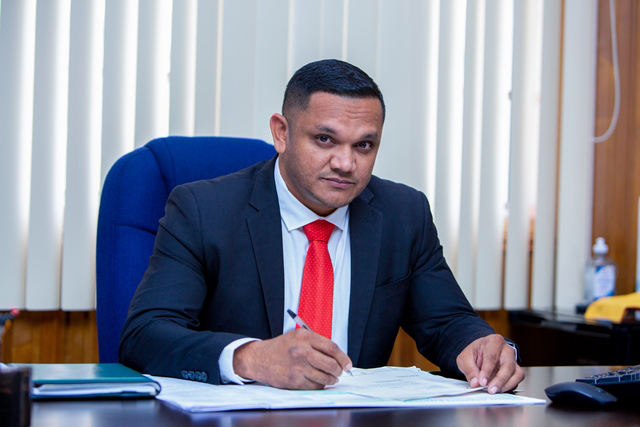Defending government’s decision to greenlight the restart of small scale mining at Marudi Mountain, in the Deep South Rupununi, Region Nine, Minister of Natural Resources Vickram Bharrat last evening said it was based on pleadings from residents of the nearby communities in need of income generation given the severe constraints from the COVID-19 pandemic.
“We in government needed to strike a balance because people need to be gainfully employed. We had to find a balance,” Bharrat last evening said when asked by Stabroek News about the decision, in light of strong opposition by indigenous activists.
Among the criticisms of a new agreement between the Guyana Geology and Mines Commission (GGMC), Romanex, Canadian-owned mining company Aurous, and the Rupununi Miners Association was the lack of consultation with communities that stand to be affected by it.
Bharrat, however, challenged this point. “With regards to not holding consultations, I would say that is not totally true because I personally went to Aishalton about five times and held meetings. I personally went into Marudi and met with all the miners and all the shop owners, along with the Director of Romanex and the leadership of the local communities in there. I personally would have went to several villages… I personally went to these villages and many of these villages asked when is Marudi restarting,” he added.
Insisting that he was present at a number of consultations in the communities, Bharrat suggested that criticisms of government’s decision was rooted in politics.
“I know there are a few comments but there is a handful of people who have political objectives and a political agenda who are asked by politicians to make comments in the negative against an economical benefit to the people in the Deep South of the Rupunui and the people of Region Nine,” he said.
The recent signing of the agreement to restart small-scale mining activities has been cited by its critics, including Deputy Speaker Lenox Shuman, as proof of government’s disregard for the rights of indigenous communities.
Activists, who say some communities only learnt of the new agreement via a Ministry of Natural Resources Facebook post, say that the exclusion of indigenous communities from having input on the resumption of mining operations violates their right to free, prior and informed consent, and they have called for government to scrap the deal and hold consultations.
The South Rupununi District Council (SRDC), which initially called attention to the agreement, has said the mining deal was concluded even though the GGMC is aware that “Marutu Taawa (Marudi Mountain) is a sacred place to the Wapichan people and that the area is subject to a pending application for extension of title by Aishalton Village. SRDC charged that the GGMC made no attempt to ensure that the Aishalton Village Council, nearby villages and SRDC were involved in decision-making around mining activities on the mountain, as was done in the past.
‘The majority’
But Bharrat stressed that Marudi was one of the main income generators for the people in the Deep South of Rupununi and they were the ones that have been asking government for the resumption.
He said that while there is agricultural produce in the communities, residents have encountered significant difficulty in transporting it.
“[The] majority of the people in Region Nine, especially in the Deep South, depended on Marudi for an income and a livelihood. If you look in the Deep South, there are not much opportunities. To get agriculture out from Aishalton or Parabara and Deep South villages is a nightmare,” he said.
“I was told that Parabara, for example, to bring out their produce—say oranges—it would take about two weeks. And the cost for transportation would probably be more than the produce they are bringing out. So what are the alternatives? Marudi is seen as a viable alternative in Region Nine,” he added.
Rejecting claims that there will be large scale mining at the location, Bharrat said that Romanex will only be doing prospecting for five years and that persons are cherry picking parts of the agreement for criticisms.
“This thing about the large scale company doing mining is utterly not true. In fact, what we are doing is [taking] away the mining licence from Romanex and giving them a prospecting licence for five years. The large company would not be doing any mining for five years; none at all. All mining activity that will be done in Marudi will be done by the indigenous; the small miners in Region Nine,” he stressed.
Noted too by Bharrat was that small miners were given strict rules for operating in the area, including that mercury must not be used and employment priority must go to nearby villagers
“There were concerns about the environment and illegal activities at the shops or landings. The right and respect of indigenous people and creating opportunities for indigenous. We have mentioned that the small miners need to respect indigenous people. If they employ people from the villages, they need to purchase from the people in Region Nine. With regard to environment, when they signed the agreement [they agreed] that mercury will not be used because that is one of the main concerns that was raised at the consultation,” he said.
Bharrat added that another concern was the destruction of medicinal plants but he did not elaborate on what alternatives would be taken to stop that.
“We have confined the small miners to a smaller area where they will be doing mining in a safe way and a mercury-free way. We would have done that to ensure there are some environmental safeguards and protection of the environment,” he added.





